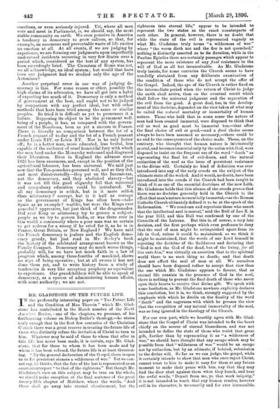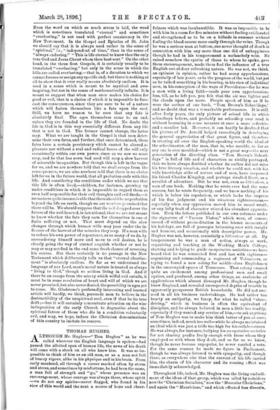MR. GLADSTONE ON THE FUTURE LIFE.
IN the profoundly interesting paper on " Tne Future Life and the Condition of Man Therein" which Mr. Glad- stone has contributed to the March number of the North America n Review,— one of the chapters, we presume, of his forthcoming volume on Bishop Butler's theology,—he states truly enough that in the first few centuries of the Christian +C lurch there was a great reserve in treating the future life of those who distinctly refuse the invitation of Christ to turn to him. Whatever may be said of those to whom that offer in t his life has never been made, it is certain, says Mr. Glad- stone, that for those to whom it has been made and by whom it has been refused, the future life is at least threaten- ing. "By the general declaration of the Gospel, there is open to us for persistent sinners a wilderness of woe." Yet we can- not say, he thinks, that the fate of the lost is represented as an exact counterpart "to that of the righteous." But though Mr. Gladstone's view on this subject may be true on the whole, we should make exception of the final sentence of the great twenty-fifth chapter of Matthew, where the words, "And these shall go away into eternal chastisement, but the righteous into eternal life," appear to be intended to represent the two states as the exact counterparts of each other. In general, however, there is no doubt that while the state of the evil is represented vaguely as what Mr. Gladstone truly terms "a, wilderness of woe" where "the worm dieth not and the fire is not quenched," nothing is distinctly asserted as to its duration, while in the Pauline Epistles there are certainly passages which appear to represent the mere existence of any final resistance to the will of God as all but inconceivable. As Mr. Gladstone truly insists, for some centuries the Church seems to have carefully abstained from any deliberate examination of the condition of those who do not accept the offer of the Gospel. Indeed, the eye of the Church is rather fixed on the intermediate period when the return of Christ to judge the earth shall arrive, than on the eventual result which shall follow the universal judgment and the separation of the evil from the good. A great deal, too, in the develop- ment of this doctrine, depended on the view taken of what may be called the natural mortality or immortality of human nature. Those who held that in some sense the nature of man had been created immortal, were disposed to think that evil as well as good must be immortal too,—that after the final choice of evil or good,—and a final choice seems always to have been assumed as necessary,—there could be no end to the consequences of the choice made. Those, on the contrary, who thought that human nature is intrinsically mortal, and becomes immortal only by the union with God, were disposed to insist on the frequent use of the word "death" as representing the final lot of evil-doers, and the natural extinction of the soul as the issue of persistent resistance to the divine will. Certainly no kind of definition was ever introduced into any of the early creeds on the subject of the ultimate state of the wicked. And it would, no doubt, have been introduced into the creeds if the Church had been taught to think of it as one of the essential doctrines of the new faith. Mr. Gladstone holds that this silence of the creeds proves that there was no doctrine generally held in the Church to the effect that man's nature is essentially immortal,—as the Roman Catholic Church ultimately defined it to be at the epoch of the Reformation. "We condemn and reprobate those who assert that the intellectual soul is mortal," said the Ball of Leo X. in the year 1513, and this Ball was confirmed by one of the Councils of the Lateran. But this is, of course, a very late decision, and the first perhaps which even professes to deny that the soul of man might be extinguished apart from its life in God, unless it could be maintained, as we think it might be maintained, that the words of our Lord himself in rejecting the doctrine of the Sadducees and declaring that "God is not the God of the dead, but of the living, for all live unto him," was virtually an assertion that in the spiritual world there is no such thing as death; and that death does not affect the soul of man at all. We ourselves should have been disposed rather to accept that view than the one which Mr. Gladstone appears to favour, that as eternal life consists in the presence of God in the soul, there is nothing to prevent the final death of those who never open their hearts to receive that divine gift. We speak with some hesitation, as Mr. Gladstone nowhere explicitly declares this conviction, but it is, we think, strongly suggested by the emphasis with which he dwells on the finality of the word "death" and the eagerness with which he presses the view that the recognition of any natural immortality of the sod, was so long ignored in the theology of the Church.
For our own part, while we heartily agree with Mr. Glad- stone that the Gospel of Christ was intended to fix the heart chiefly on the source of eternal blessedness, and was not intended to define the state of those who resist that great gift, further than by representing it as "a. wilderness of woe," we should have thought that any escape which may be possible from that "wilderness of woe" would be an escape not by extinction, but by an ultimate, if belated, submission to the divine will. So far as we can judge, the gospel, while it certainly intends to show that men who once reject Christ, cannot trust to him to make it easy for them at any future moment to make their peace with him, nay that they may find the door shut against them when they knock, and hear the awful words, "Depart from me, ye that work iniquity," it is not intended to teach that any human resolve, however evil in its character, is necessarily and for ever irreversible. Even the word on which so much stress is laid, the woad which is sometimes translated "eternal" and sometimes "everlasting," is not used with perfect consistency in the New Testament. In the Gospel and Epistles of St. John we should say that it is always used rather in the sense of "spiritual," i.e., "independent of time," than in the sense of "always enduring." "This is life eternal to know thee the only true God and Jeans Christ whom thou haat sent." On the other band, in the three first Gospels, it is certainly usually to be translated "everlasting," but only in the sense in which the hills are called everlasting,—that is, of a duration to which we cannot foresee or assign any specific end; but there is nothing at all to show that it ever really means absolutely endless. It is used in a sense which is meant to be mystical and awe- inspiring, but not in the sense of mathematically infinite. It is meant to suggest that when man once makes his choice for good or evil, that is a choice of which it is impossible to fore- cast the consequences, since they are sure to be of a nature which will fasten themselves like a fate upon the soul. Still, we have no reason to be sure that any fate is absolutely final. The ages themselves come to an end, unless they are founded in the life of God. No doubt the life in God is in this way essentially different from any life that is not in God. The former cannot change, the latter may. What we are taught in the Gospel is that men deter- mine their own fates, and further, that once determined, these fates have a certain persistency which cannot be altered at pleasure nor without a real and radical heave of the will only occasionally within our own power, since as we sow we must reap, and be that has sown bad seed will reap a slow harvest of miserable incapacities. But though this is left in the vague for us, and we are nowhere told that we shall escape from the consequences, we are also nowhere told that there is no choice left for us in the future world, that all probation ends with this life. And considering the conditions under which we see that this life is often lived,—children, for instance, growing up under conditions in which it is impossible to regard them as even half responsible for their evil thoughts and evil deeds,—it seems to us quite inconceivable that there should be noprobation beyond the life on earth, though we are nowberspromisedthat there will be. We should suppose that the veil dropped over the future of the evil-hearted, is intentional, that we are not meant to know whether the fate they earn for themselves is one of finite suffering or not. That must depend on the slow changes through which human wills may pass under the in- fluence of the harvest of the miseries they reap. If a man wills to reduce his own power of repentance, as so many of us do, by surrendering himself more and more to evil desires, he is clearly going the way of eternal anguish whether or not he may or may not find in the end some fresh chance of reversing his course. But there certainly is no passage in the New Testament which deliberately tells us that "eternal chastise- ment " is absolutely endless. So far as we understand the language of our Lord, man's moral nature is treated as always
living to God," though so seldom living in God. And if there be an escape from the misery which wilful evil entails, it must be in some revolution of heart and will of which we are never promised, but also never denied, the possibility in ages yet to come. Mr. Gladstone's profoundly interesting and learned article will hardly, we think, persuade men to believe in the destructibility of the unspiritual soul, even if that be its true drift ;—bnt it will certainly concentrate attention on the wise indisposition of the early Church to dogmatise about the spiritual future of those who die in a condition voluntarily evil, and may, we hope, induce the Christian denominations of this country to imitate its reserve.







































 Previous page
Previous page